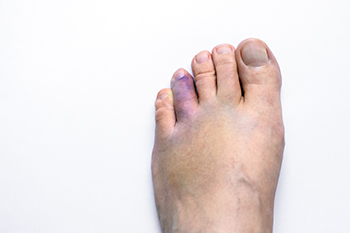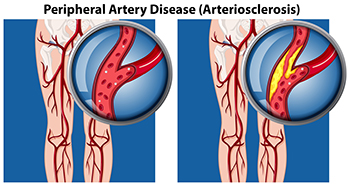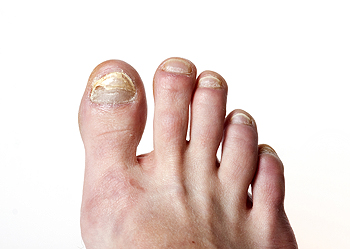Connect With Us
Blog
Items filtered by date: June 2023
Treatment for a Broken Toe

Common reasons people can break a toe can include a heavy object dropping on one of them, or it may happen from stubbing it into a piece of furniture. There is no mistaking a broken toe when it happens, as there is immediate pain, bruising, and swelling. Additionally, it is often difficult to walk, and mild relief may be found when the foot is frequently elevated. It is beneficial to have an X-ray performed which can confirm the fracture, and determine its severity. Patients may find success in using the buddy taping method as a possible remedy for their broken toe. This is done by taping the affected toe to the toe next to it, which can generally provide the stability that is needed as it heals. Severely broken toes may have a bone protruding from them and will require medical attention. If you have a broken toe, it is suggested that you visit a podiatrist who can correctly diagnose it, and offer the treatment method that is right for you.
A broken toe can be very painful and lead to complications if not properly fixed. If you have any concerns about your feet, contact Tanisha Richmond, DPM from Richmond Foot & Ankle, LLC. Our doctor will treat your foot and ankle needs.
What to Know About a Broken Toe
Although most people try to avoid foot trauma such as banging, stubbing, or dropping heavy objects on their feet, the unfortunate fact is that it is a common occurrence. Given the fact that toes are positioned in front of the feet, they typically sustain the brunt of such trauma. When trauma occurs to a toe, the result can be a painful break (fracture).
Symptoms of a Broken Toe
- Throbbing pain
- Swelling
- Bruising on the skin and toenail
- The inability to move the toe
- Toe appears crooked or disfigured
- Tingling or numbness in the toe
Generally, it is best to stay off of the injured toe with the affected foot elevated.
Severe toe fractures may be treated with a splint, cast, and in some cases, minor surgery. Due to its position and the pressure it endures with daily activity, future complications can occur if the big toe is not properly treated.
If you have any questions please feel free to contact our office located in Dayton, OH . We offer the newest diagnostic and treatment technologies for all your foot and ankle needs.
Why Live with Pain and Numbness in Your Feet?
Peripheral Artery Disease Can Affect Your Feet

Peripheral artery disease is a cardiovascular condition that can seriously affect the health of your feet. When fatty deposits build up in the arteries that serve the legs, the flow of blood to the feet and toes can be restricted. Common symptoms of peripheral artery disease, or PAD, include hair loss and weakness in the legs and feet, brittle or slow-growing toenails, and numbness in the lower extremities. One of the more serious results of PAD is the increased inability of sores or cuts on the feet and ankles to heal normally. If these wounds are not noticed or left unattended, they can become ulcerous. This is a common side effect of diabetes as the result of high levels of blood sugar. Foot ulcers can become gangrenous and increase the danger of losing a limb. Eating a healthy diet, quitting smoking and drinking, along with losing weight can all help to reduce the effects of peripheral artery disease. For help with this condition as it affects the feet, it is suggested that you make an appointment with a podiatrist.
Peripheral artery disease can pose a serious risk to your health. It can increase the risk of stroke and heart attack. If you have symptoms of peripheral artery disease, consult with Tanisha Richmond, DPM from Richmond Foot & Ankle, LLC. Our doctor will assess your condition and provide you with quality foot and ankle treatment.
Peripheral artery disease (PAD) is when arteries are constricted due to plaque (fatty deposits) build-up. This results in less blood flow to the legs and other extremities. The main cause of PAD is atherosclerosis, in which plaque builds up in the arteries.
Symptoms
Symptoms of PAD include:
- Claudication (leg pain from walking)
- Numbness in legs
- Decrease in growth of leg hair and toenails
- Paleness of the skin
- Erectile dysfunction
- Sores and wounds on legs and feet that won’t heal
- Coldness in one leg
It is important to note that a majority of individuals never show any symptoms of PAD.
Diagnosis
While PAD occurs in the legs and arteries, Podiatrists can diagnose PAD. Podiatrists utilize a test called an ankle-brachial index (ABI). An ABI test compares blood pressure in your arm to you ankle to see if any abnormality occurs. Ultrasound and imaging devices may also be used.
Treatment
Fortunately, lifestyle changes such as maintaining a healthy diet, exercising, managing cholesterol and blood sugar levels, and quitting smoking, can all treat PAD. Medications that prevent clots from occurring can be prescribed. Finally, in some cases, surgery may be recommended.
If you have any questions, please feel free to contact our office located in Dayton, OH . We offer the newest diagnostic and treatment technologies for all your foot care needs.
Peripheral Artery Disease Can Affect Your Feet

Peripheral artery disease is a cardiovascular condition that can seriously affect the health of your feet. When fatty deposits build up in the arteries that serve the legs, the flow of blood to the feet and toes can be restricted. Common symptoms of peripheral artery disease, or PAD, include hair loss and weakness in the legs and feet, brittle or slow-growing toenails, and numbness in the lower extremities. One of the more serious results of PAD is the increased inability of sores or cuts on the feet and ankles to heal normally. If these wounds are not noticed or left unattended, they can become ulcerous. This is a common side effect of diabetes as the result of high levels of blood sugar. Foot ulcers can become gangrenous and increase the danger of losing a limb. Eating a healthy diet, quitting smoking and drinking, along with losing weight can all help to reduce the effects of peripheral artery disease. For help with this condition as it affects the feet, it is suggested that you make an appointment with a podiatrist.
Peripheral artery disease can pose a serious risk to your health. It can increase the risk of stroke and heart attack. If you have symptoms of peripheral artery disease, consult with Tanisha Richmond, DPM from Richmond Foot & Ankle, LLC. Our doctor will assess your condition and provide you with quality foot and ankle treatment.
Peripheral artery disease (PAD) is when arteries are constricted due to plaque (fatty deposits) build-up. This results in less blood flow to the legs and other extremities. The main cause of PAD is atherosclerosis, in which plaque builds up in the arteries.
Symptoms
Symptoms of PAD include:
- Claudication (leg pain from walking)
- Numbness in legs
- Decrease in growth of leg hair and toenails
- Paleness of the skin
- Erectile dysfunction
- Sores and wounds on legs and feet that won’t heal
- Coldness in one leg
It is important to note that a majority of individuals never show any symptoms of PAD.
Diagnosis
While PAD occurs in the legs and arteries, Podiatrists can diagnose PAD. Podiatrists utilize a test called an ankle-brachial index (ABI). An ABI test compares blood pressure in your arm to you ankle to see if any abnormality occurs. Ultrasound and imaging devices may also be used.
Treatment
Fortunately, lifestyle changes such as maintaining a healthy diet, exercising, managing cholesterol and blood sugar levels, and quitting smoking, can all treat PAD. Medications that prevent clots from occurring can be prescribed. Finally, in some cases, surgery may be recommended.
If you have any questions, please feel free to contact our office located in Dayton, OH . We offer the newest diagnostic and treatment technologies for all your foot care needs.
Feet Smell in Children

Caring for a child can present a whole host of challenges to new parents. One of these challenges is caring for the child’s feet. Some new parents might notice that their child’s feet have an unpleasant odor. Importantly, many children experience this phenomenon. There are a number of different reasons for this. For example, many children are highly physically active and sweat significantly, which can lead to smelly feet. There are steps, however, that parents can take to mitigate smelly feet in their children. Most importantly, parents can help their children keep their feet clean and dry. Parents might also even wash and dry their child’s shoes regularly. This prevents the accumulation of bacteria in the shoes. If you are the parent of a child and are looking to protect the health of their feet, it is suggested that you contact a podiatrist for an appointment.
Making sure that your children maintain good foot health is very important as they grow. If you have any questions, contact Tanisha Richmond, DPM of Richmond Foot & Ankle, LLC. Our doctor can provide the care you need to keep you pain-free and on your feet.
Keeping Children's Feet Healthy
Having healthy feet during childhood can help prevent medical problems later in life, namely in the back and legs. As children grow, their feet require different types of care. Here are some things to consider...
Although babies do not walk yet, it is still very important to take care of their feet.
Avoid putting tight shoes or socks on his or her feet.
Allow the baby to stretch and kick his or her feet to feel comfortable.
As a toddler, kids are now on the move and begin to develop differently. At this age, toddlers are getting a feel for walking, so don’t be alarmed if your toddler is unsteady or ‘walks funny’.
As your child gets older, it is important to teach them how to take care of their feet.
Show them proper hygiene to prevent infections such as fungus.
Be watchful for any pain or injury.
Have all injuries checked by a doctor as soon as possible.
Comfortable, protective shoes should always be worn, especially at play.
If you have any questions please feel free to contact our office located in Dayton, OH . We offer the newest diagnostic and treatment technologies for all your foot and ankle needs.
Feet Smell in Children

Caring for a child can present a whole host of challenges to new parents. One of these challenges is caring for the child’s feet. Some new parents might notice that their child’s feet have an unpleasant odor. Importantly, many children experience this phenomenon. There are a number of different reasons for this. For example, many children are highly physically active and sweat significantly, which can lead to smelly feet. There are steps, however, that parents can take to mitigate smelly feet in their children. Most importantly, parents can help their children keep their feet clean and dry. Parents might also even wash and dry their child’s shoes regularly. This prevents the accumulation of bacteria in the shoes. If you are the parent of a child and are looking to protect the health of their feet, it is suggested that you contact a podiatrist for an appointment.
Making sure that your children maintain good foot health is very important as they grow. If you have any questions, contact Tanisha Richmond, DPM of Richmond Foot & Ankle, LLC. Our doctor can provide the care you need to keep you pain-free and on your feet.
Keeping Children's Feet Healthy
Having healthy feet during childhood can help prevent medical problems later in life, namely in the back and legs. As children grow, their feet require different types of care. Here are some things to consider...
Although babies do not walk yet, it is still very important to take care of their feet.
Avoid putting tight shoes or socks on his or her feet.
Allow the baby to stretch and kick his or her feet to feel comfortable.
As a toddler, kids are now on the move and begin to develop differently. At this age, toddlers are getting a feel for walking, so don’t be alarmed if your toddler is unsteady or ‘walks funny’.
As your child gets older, it is important to teach them how to take care of their feet.
Show them proper hygiene to prevent infections such as fungus.
Be watchful for any pain or injury.
Have all injuries checked by a doctor as soon as possible.
Comfortable, protective shoes should always be worn, especially at play.
If you have any questions please feel free to contact our office located in Dayton, OH . We offer the newest diagnostic and treatment technologies for all your foot and ankle needs.
Do Your Child's Feet Hurt?
Do Your Child's Feet Hurt?
Is Toenail Fungus Contagious?

The toenails can look disfigured with a severe case of toenail fungus. It is caused by the human papillomavirus (HPV) and is considered to be highly contagious. This virus lives and thrives in warm and moist environments, such as public swimming pools, shower rooms, or similar areas. Some of the symptoms that are associated with toenail fungus can include yellowed nails that can become brittle, and the affected nails may emit an odor. It is beneficial to implement certain methods that are successful in preventing toenail fungus. These can consist of wearing appropriate shoes, such as flip flops or water shoes, and refraining from sharing shoes, socks, and towels. Toenail fungus does not improve without medical attention. If you have developed this condition, it is suggested that you confer with a podiatrist who can guide you toward the correct treatment options, which may include prescribed medicine.
If left untreated, toenail fungus may spread to other toenails, skin, or even fingernails. If you suspect you have toenail fungus it is important to seek treatment right away. For more information about treatment, contact Tanisha Richmond, DPM of Richmond Foot & Ankle, LLC. Our doctor can provide the care you need to keep you pain-free and on your feet.
Symptoms
- Warped or oddly shaped nails
- Yellowish nails
- Loose/separated nail
- Buildup of bits and pieces of nail fragments under the nail
- Brittle, broken, thickened nail
Treatment
If self-care strategies and over-the-counter medications does not help your fungus, your podiatrist may give you a prescription drug instead. Even if you find relief from your toenail fungus symptoms, you may experience a repeat infection in the future.
Prevention
In order to prevent getting toenail fungus in the future, you should always make sure to wash your feet with soap and water. After washing, it is important to dry your feet thoroughly especially in between the toes. When trimming your toenails, be sure to trim straight across instead of in a rounded shape. It is crucial not to cover up discolored nails with nail polish because that will prevent your nail from being able to “breathe”.
In some cases, surgical procedure may be needed to remove the toenail fungus. Consult with your podiatrist about the best treatment options for your case of toenail fungus.
If you have any questions, please feel free to contact our office located in Dayton, OH . We offer the newest diagnostic and treatment technologies for all your foot care needs.
Blog Archives
- March 2025
- February 2025
- January 2025
- December 2024
- November 2024
- October 2024
- September 2024
- August 2024
- July 2024
- June 2024
- May 2024
- April 2024
- March 2024
- February 2024
- January 2024
- December 2023
- November 2023
- October 2023
- September 2023
- August 2023
- July 2023
- June 2023
- May 2023
- April 2023
- March 2023
- February 2023
- January 2023
- December 2022
- November 2022
- October 2022
- September 2022
- August 2022
- July 2022
- June 2022
- May 2022
- April 2022
- March 2022
- February 2022
- January 2022
- December 2021
- November 2021
- October 2021
- September 2021
- August 2021
- July 2021
- June 2021
- May 2021
- April 2021
- March 2021
- February 2021
- January 2021
- December 2020
- November 2020
- October 2020
- September 2020
- August 2020
- July 2020
- June 2020
- May 2020
- April 2020
- March 2020
- February 2020
- January 2020
- December 2019
- November 2019
- October 2019
- September 2019
- August 2019
- July 2019
- June 2019
- May 2019
- April 2019
- March 2019
- February 2019
- January 2019
- December 2018
- November 2018

